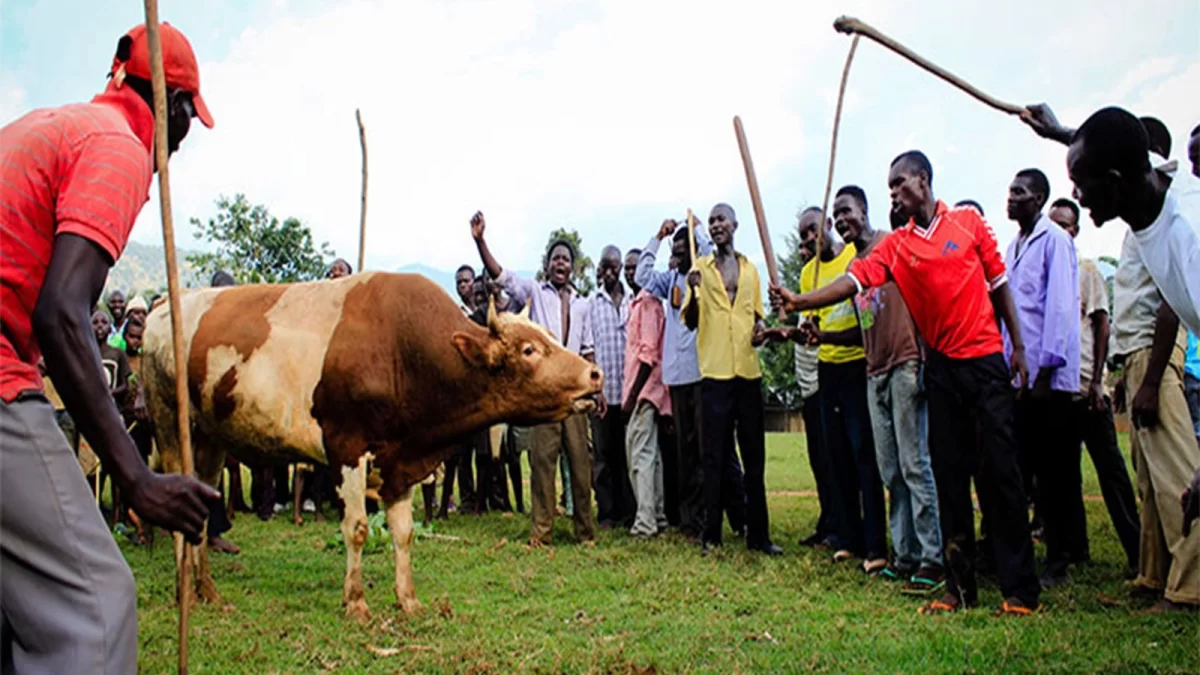Mbale Bududa Bull Fighting Tradition

Explore Kapkwai Forest Exploration Center
September 12, 2023
Top Safari Attractions in East Africa
September 12, 2023Exploring the Unique Mbale Bududa Bull Fighting Tradition in the Bugisu Eastern Region of Uganda
Mbale Bududa Bull Fighting Tradition: Unveiling the Spectacle of Bull Fighting in Bududa — Tucked away in the vast and mountainous landscapes of the Eastern region of Uganda lies the captivating district of Bududa. This district, known for its lush farms and dense population, is a place where a unique and thrilling tradition unfolds—the art of bull fighting. Amidst the cultivation of bountiful crops such as bananas, cabbages, and maize, the people of Bududa also nurture a deep bond with their livestock, which includes cows, goats, pigs, and poultry.
The Enigmatic Bududa Bull Fighting Tradition
Nestled on the slopes of the magnificent Mount Elgon, Bududa isn’t typically hailed as a tourist hotspot. Its history of landslides may have cast a shadow, but beneath the surface lies an extraordinary cultural phenomenon—the Bududa bull fighting tradition. It’s a tradition that remains relatively unknown beyond the local community, despite its captivating nature.
A Saturday Evening Spectacle
Every other Saturday evening, the men and boys of Bududa gather with their prized bulls in a nearby field, setting the stage for an exhilarating spectacle that draws locals and travelers alike. At 5:00 pm, the field comes alive as more bulls arrive, each owner guiding their bull to meet its opponent. The smaller and younger bulls are paired with rivals of similar size, while the larger, more muscular bulls face off against their formidable counterparts.
The Battle Unfolds
The field becomes an arena, hosting more than 50 bulls in a contest of strength and will. Owners play an essential role as they urge their bulls into action, directing them with purpose. Finding the perfect match for their bull becomes a mission, and tensions run high as two imposing bulls face each other with unwavering determination.
The Roar of Bulls
The air is filled with the powerful lowing of bulls, each bellowing with all their might to intimidate their adversary. Farmers share a deep connection with their animals, viewing their bull’s victory as a personal triumph. As the two bulls lock horns and begin pushing each other, the atmosphere is charged with excitement. Moments of intense struggle give way to bursts of force, as the bulls engage in a battle of dominance.
Strategy and Tactics
Bull owners employ tactics like sharpening their bull’s horns with broken bottles, aiming to gain an advantage. Sharp horns can tear the opponent’s skin, inflicting pain and forcing them out of the game. The stronger bull relentlessly pursues the retreating opponent, maintaining the fight until the defeated bull is finally driven away from the arena.
A Tradition of Resilience
While some might question the ethics of such fights, these African bulls are remarkably resilient. They heal from their injuries naturally, with the assistance of a local veterinarian only sought if their wounds show signs of infection after three days. As the victorious farmer’s bull celebrates its win, the family throws a joyous party, complete with village brew, inviting the entire community to share in the jubilation.
A Celebration of Strength and Vitality
Far from cruelty, these bullfights are organized to entertain and enhance the well-being of the animals. The fights stimulate the bulls’ appetites, strengthen their necks and chests, and provide an outlet for their excess energy, preventing destructive and hostile behavior.
Origins of the Tradition
The tradition traces its roots to conflicts between communities over access to a salty water source in Namasho. Initially marked by violence and loss of life, the communities eventually agreed to share the limited water resource but retained the practice of bull fighting for entertainment.
Rules and Governance
The bullfights in Bududa are legal and well-organized, overseen by a dedicated committee responsible for addressing any issues that may arise during or after the events. This committee plays a pivotal role in resolving disputes among bull owners, ensuring that the tradition remains a source of enjoyment and camaraderie rather than a cause for discord. While the connection between farmers and their bulls runs deep, disputes are settled by the committee, not local council leaders, to maintain fairness and unity within the community.

